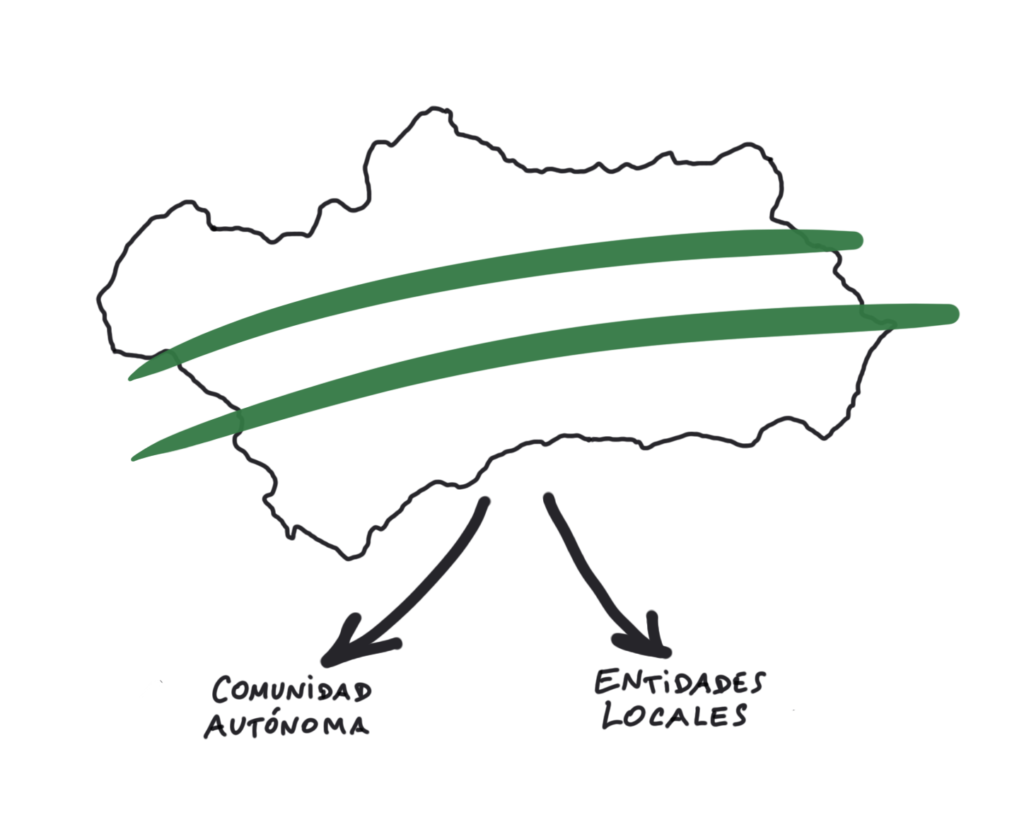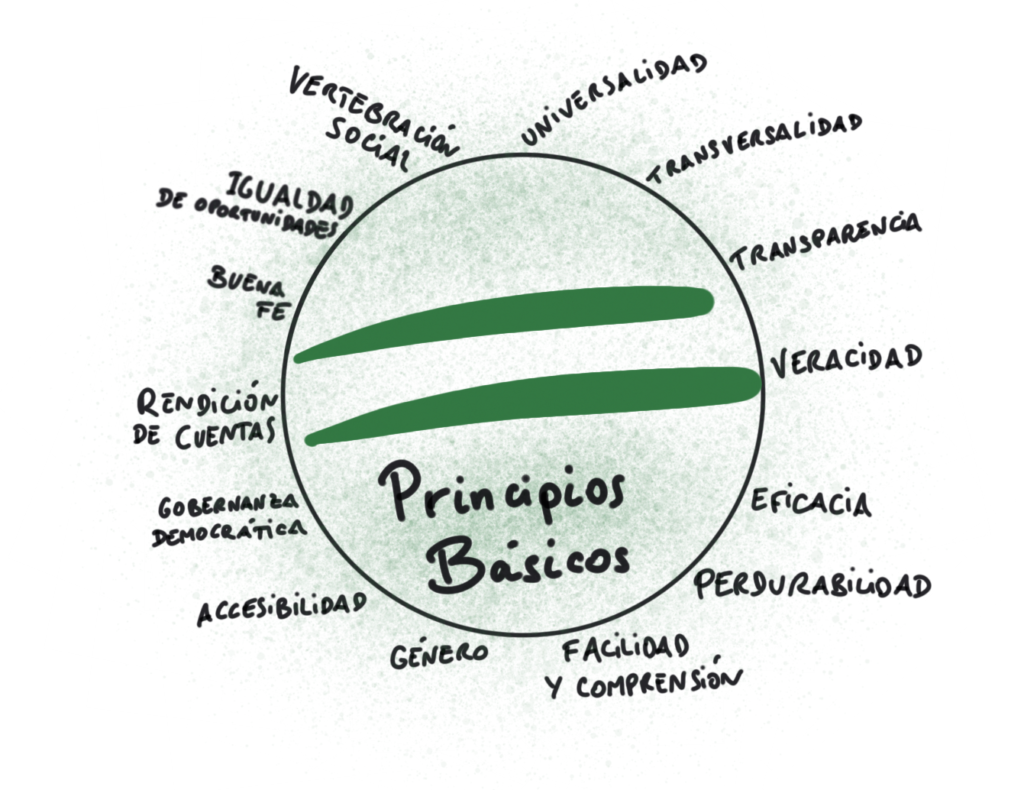The 7/2017 Citizen Participation Act is designed for Andalusian citizens to actively participate in Andalusia public life.
Representative democracy has entailed a great historical breakthrough in which voting once every four years is necessary, but insufficient. Citizens demand both new forms of participation complementing political institutions, and to exceed the limits of representative democracy based on the vote. Social transformations and the role of technology pose a challenge and an opportunity to ensure the same opportunities for opinion, expression and participation, on equal terms, in public affairs. This Act is the Andalusian frame of reference for the exercise of real and effective citizen participation.

Justification and legal background
This Act entails the continuation of a path that began at European level in 2001 with the Charter of Fundamental Rights of the European Union, the reflections of the White Paper on European Governance, and the Recommendation on the participation of citizens in local public life.
The Spanish Constitution (1978) includes, in its article 9.2, the duty of public authorities to promote citizen participation, facilitating it for “all citizens in political, economic, cultural and social life”. It is also referenced to in article 23.1, where the right of participation in public affairs either by directly or representation is stated.
In our renewed Statute of Autonomy (2007) there are also numerous references to citizen participation: Article 10.3.19ª directly stated citizen participation as an objective of the Autonomous Community for an advanced and participatory social democracy. In fact, this idea appears transversally through the entire text. In Article 30 this principle is specified as the right not only to elect their representatives, but also to promote and present legislative initiatives and participate in the drafting of laws, to promote calls for referendums, individual and collective petitions, in writing, and to actively participate in Andalusian public life through proposals.
This right for Andalusians, as set out in section 2 of article 30 , also extends to European citizens and foreigners residing in our territory. In Article 31 citizen participation as part of the right to good administration it is included, as well as the right of access to public information, which connects with the principle of government transparency. These aspects are also mentioned in article 134 where reference is made to the institutional functioning of the Administration of the Junta de Andalucía, as well as in article 138, where the need to evaluate public policies is discussed.

The 7/17 Act is framed within the autonomous competences in citizen participation and therefore it is included in the Statute of Autonomy when, in article 78, the competence is expressed in matters of popular consultations exclusively for the regional and local administrations. Likewise, both article 46 and article 60 state the competence in the matter of self-government, of local autonomy.
Other previous laws have cleared the ground for the appearance and development of 717, such as the 2/2001 Act on the regulation of local popular consultations in Andalusia, the 8/2011 Act on the Popular Legislative Initiative and Town Halls , known as “the law of the 110 seat”, regarding the reform of the Regulation of the Parliament of Andalusia to modify its article 125 and allow the presentation of popular legislative initiatives and, especially, the 1/2014 Act of Public Transparency of Andalusia.
At a local level, the 7/1985 Act on Bases of Local Regime and the 5/2010 Act of Local Autonomy of Andalusia, both pioneers in guaranteeing the right to citizen participation, are laws of reference. In the first one, there was already a mention about participation in local management and collaboration with neighbours in its article 18 , as well as about the ways of exercising participation as a self-managed organisation in article 69.2 . The second one lists, in its article 9, its own competences, among which is the establishment and development of citizen participation structures, which relates to the use of new technologies.
The work of some pioneer municipal governments has been fundamental to reach this Act. One of the most widespread and consolidated participatory practices in Andalusia is that of participatory budgets, in which the Declaration of Antequera de 2008 constitutes an important precedent.
In this sense, the importance of citizen participation as a legal principle and legal right is evident. The 717 Act,
“… Within the limits established by the Spanish Constitution, aims at promoting the real and effective participation of everyone, along with the current context and citizen demand for more democracy, as legitimate social and political aspirations expressed throughout the process of contributions described above developed to develop this law. ”
The 717 Act thus intends to develop the processes, practices and instruments for participatory democracy, which complement the representative, while, at the same time, permanent channels of interaction between government and citizens can be articulated.
Purposes
The main purpose of the 717 Act is the regulation of the right of citizen participation in the direction of autonomous and local public affairs in Andalusia, in a real and effective manner, and on equal terms, directly or through the entities recognized for citizen participation, as well as the promotion of such participation, and always within the legal framework established at all administrative levels. This includes the right to fully participate in public decisions derived from the government and administration of the Autonomous Community and local Andalusian entities. The 717 Act contemplates the following purposes:
- Promotion of citizen participation, establishing a participatory culture in the functioning of the Administration.
- Encouragement of greater effectiveness of political and administrative action through the collective construction of public policies, with a mutual enrichment of citizenship.
- Improvement and strengthening of the communication between government and citizens.
- Facilitation for individuals and entities of the exercise of initiatives for the proposal of public policies and participation processes.
- Establishing mechanisms for citizen participation in accountability (policy evaluation, service provision, opinion polls).
- Encouraging the social participation of groups in vulnerable situations: women, minors and the elderly.
- Dissemination of the culture and participatory habits by sensitizing and training since childhood.
- Strengthening of the social vertebration through participation.
- Encouragement for the collaboration between regional and local administrations.
This Act will have effects on every administrative and government levels of the Autonomous Community and local entities of Andalusia, applying to the Administration of the Junta de Andalucía, its agencies, the entities that make up the Andalusian local Administration and the entities dependent on them.

The basic principles of this Act are:
- Universality: the entire citizenry has the right to participate.
- Transversality: integrated law at all levels.
- Transparency: accessible public information (Transparency Law).
- Truthfulness: public information must be true and accurate.
- Efficiency: exercise of useful and viable participation.
- Durability: perspective of continuous and sustained process over time.
- Ease and understanding: simple and understandable information.
- Inclusion of the gender perspective in public policies.
- Accessibility: adaptation of media and languages in an inclusive manner, without technological discrimination.
- Democratic governance: government action from a global and inclusive perspective.
- Accountability: evaluation of policies by citizens.
- Good faith: exercise of rights from loyal behavior, for Administration and citizens.
- Equal opportunities: non-discrimination and universal accessibility.
- Social vertebration: integration of social organisations.

Rights and obligations
The right to citizen participation is defined as such in article 6 as follows:
All citizens, with the ability to act in accordance with the basic rules of common administrative procedure, who have the political status of Andalusians, and foreign people residing in Andalusia have the right to participate in the process of directing public affairs that are the responsibility of the Autonomous Community of Andalusia and the Andalusian local entities, under the terms set forth in this law.
According to Article 2, citizen participation may be exercised directly or through citizen participation entities, which are:
- Private non-profit entities: validly constituted, that act in Andalusia and have citizen participation in their aims.
- Entities representing collective interests.
- Groups of natural or legal persons formed as platforms, movements, forums or citizen networks without legal personality.
- Trade union organisations, business associations, professional associations and other entities representing collective interests.
The obligations of the Andalusian public administrations in citizen participation are:
- Integrating citizen participation in all their actions.
- Promoting, encouraging and guaranteeing access to citizen participation.
- Establishing the relevant means for the exercise of participation through ICTs and encourage their use.
- Promoting the signing of agreements and agreements with other public administrations.
- Ensuring compliance with personal data protection laws .
- Establishing channels of publicity and promotion of participation.
Citizen Participation Processes
According to article 10, citizen participation processes are:
the set of actions, procedures and instruments ordered and sequenced in time, developed by the Andalusian public administrations in the scope of their powers, to enable the exercise of the right of citizens to participate, under conditions of equality and in a real way and effective, individually or collectively, in the direction and management of regional and local public affairs.
In these processes, the principle of local autonomy will be guaranteed, always complying with the legal system and the powers attributed. The different types of citizen participation processes are:
- Participatory deliberation.
- Development of participatory budgets.
- Popular queries:
- Proposal of public policies and elaboration of norms.
- Monitoring and evaluation of public policies and provision of public services.
- Participatory promotion measures:
In Laboratory 717, we have contemplated a special type of citizen participation not expressly contemplated in the 717 Act. These are cases in which citizen participation is not restricted to one or several processes, but cases in which there is a political will to extend citizen participation to all areas and spheres of the municipality. In this sense, we talk about transversal models of participation in reference to these holistic, comprehensive processes that deal with participation in a transversal way and through it deal with all areas of government and municipal competence.
These processes may develop the following issues or subjects :
- Proposal, adoption, monitoring and evaluation of public policies.
- Development of planning instruments for policy determination.
- Prioritization of specific elements of expenditure.
- Development of laws and regulations.
- Provision, monitoring and evaluation of public services.
Timing
Public Administrations may initiate citizen participation processes ex officio or at the request of natural persons and the entities referred to above. If three months pass since the presentation of the citizen initiative without an agreed starting date, the petition will be understood as rejected.
Participation processes may not be called or developed between the call for elections (to General Courts, to the Junta de Andalucía, municipal and referendums that affect the territorial scope of the process) and 90 days after the constitution of new governments (regional or local).
Process Efficiency
Citizen participation processes do not undermine the competences and powers of municipal and regional governments and their decision-making. Of course, the law requires to justify and motivate the causes for not initiating or concluding the participatory process demanded by the citizens and agents of participation (art. 16). And if the results are not assumed by the competent governments, the competent body for decision-making will have to express the reason for it. These processes complement those others provided in general and sectoral rules.
Adaptation to the local level
Local entities will have to adapt this Act through regulations and ordinances regulating the processes, their requirements and procedures. In Laboratory 717 we are preparing some practical materials to help this development of the 717 Act in the local regulations, something useful for the agents and technicians who will have to prepare these regulations soon.